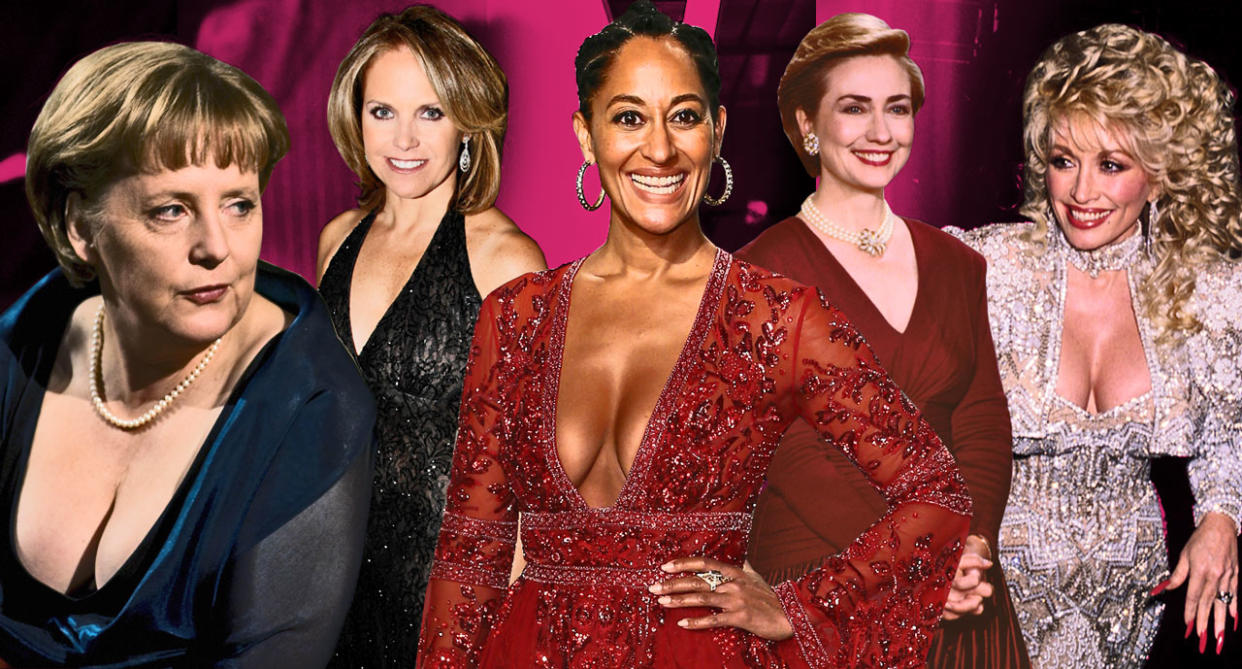Breasts in business: How to handle them in the workplace

There are many reasons for Katie Couric’s success — smarts, humanity, and tenacity, just for starters. Still, the seasoned journalist recently recalled a time, early in her career, when a CNN executive reduced her achievements to a curious collection of attributes.
“She’s successful because of her hard work, intelligence, and breast size,” were the executive’s stunningly out-of-line comments, Couric recalled at a #WeSeeEqual forum on the state of women in the workplace at Proctor & Gamble headquarters in March.

“I’ve been very fortunate in terms of not being subjected to a lot of sexual misconduct, but certainly I have been subjected to widely held attitudes about women, about compartmentalizing women,” Couric had said when asked about career obstacles by P&G’s Carolyn Tastad. She cited oft-used descriptors of herself, such as “cute” and “perky,” which she called “marginalizing,” and then offered the CNN executive’s egregious comments, for which she called him out in a letter. He responded with a telephone call, she said, “dripping with apologies.”
Unfortunately, Couric is far from alone when it comes to receiving unsolicited comments about her body, specifically regarding breasts. Celebs from Tracee Ellis Ross to Dolly Parton have been on the receiving end of such commentary, as have politicians including Germany’s chancellor Angela Merkel, who attended the Oslo opera in a gorgeous gown years ago only to be called out for showing cleavage, and Hillary Clinton, who was taken to task for her cleavage by a Washington Post reporter back in 2007.

“There was cleavage on display Wednesday afternoon on C-SPAN2. It belonged to Sen. Hillary Clinton,” fashion editor Robin Givhan wrote. While she commended Clinton’s fashion choice, she also wrote, “With Clinton, there was the sense that you were catching a surreptitious glimpse at something private. You were intruding — being a voyeur.”
And it’s not just people who have very on-camera careers who are subject to comments like this (as many reading this likely understand all too well). More than a third of women say a senior male colleague has made inappropriate comments about their breasts, sex life, butt, or clothes, according to a Slater & Gordon poll from 2013. In November 2017, Fairygodboss, a job review website for women, surveyed 500 women in their community and 43 percent of respondents said they had experienced harassment in the workplace.
Obviously, the problem is larger than breasts, but they’re a big part of it, no matter what your cup size. The Slater & Gordon survey found that one in six women have had colleagues look down their shirt, and almost half have received comments about their breasts in the workplace. Sexual harassment like this has led one in eight women to leave jobs because the conditions made them feel so uncomfortable.
“Women’s bodies are just assumed to be objects of conversation,” Jaclyn Friedman, editor of Yes Means Yes: Visions of Female Sexual Power and a World Without Rape and author of Unscrewed: Women, Sex, Power and How to Stop Letting the System Screw Us All, tells Yahoo Lifestyle of why women are so susceptible to breast-attention at work. “And I think that there is this underlying assumption that a lot of time it’s a woman’s job not to distract men with their bodies. That if men are feeling distracted by seeing us as sexual beings, that’s our problem and not the man’s, who has never been asked to just deal with it.”
According to a report from the Captivate Network, 45 percent of people reported seeing cleavage in the office. But 87 percent of senior managers said they find it distracting.
Givhan, writing for the Post about Clinton, certainly did. “To display cleavage in a setting that does not involve cocktails and hors d’oeuvres is a provocation,” she wrote. “It requires that a woman be utterly at ease in her skin, coolly confident about her appearance, unflinching about her sense of style.” Or… it requires that the wearer has large breasts and simply wants to wear a shirt that isn’t a turtleneck. Or wants to wear what she wants, because she can.

“It’s crazy that we have to stress about this so much,” Friedman says.
Samantha von Sperling — etiquette coach, stylist, and image consultant — agrees. But only to a point. “That argument is that men are powerless and defenseless to the almighty breast. That they are beasts and cannot control themselves,” she tells Yahoo Lifestyle. “[But] Men not being able to control themselves is garbage. It’s not about dressing because other people can’t behave themselves. It’s about dressing to the culture that you’re in. And if you don’t understand what world you’re in, take a look around you and err on the side of conservative.”
Fairygodboss CEO and co-founder Georgene Huang is also a believer in fitting into whatever context you’re dressing for.
“Office dress codes are more common in certain industries than others (hospitality or investment banking), and it’s important to have an understanding of what is and is not appropriate for your particular office setting,” Huang explains. “I think context is everything. In certain professions, it may be more acceptable to show cleavage than in others. People should dress in accordance with their office culture and what makes them comfortable.”
Unfortunately, those two things don’t always mesh, which is why we can’t wear yoga pants or go bra-less in corporate America. And that’s where it gets unfair, especially for women.
“Women unfortunately have more societal judgments to contend with, such as whether a dress is perceived as too short, or a shirt is cut too low, compared to men, who can typically get away with wearing a ‘uniform’ like a pantsuit,” she says. “In general, our research shows that female jobseekers are subject to very unfair stereotypes based on their appearance.”
And obviously, many women settle for “appropriate” so as to not rock the boat at work.
“An individual person, unless they have a ton of power in the workplace, their goal is mostly just to not get in trouble and do well at work,” Friedman points out. “Because we all need jobs and want to succeed in our careers. But that doesn’t mean that the standards we’re asked to adhere to are not double standards.” Yet, here we are, at the office, with wires cutting into our sides and bra straps digging into our shoulders. “We all make compromises to get along in our lives,” says Friedman. “I don’t think it’s just, but we all do it.”
Friedman supports anyone who decides not to make that compromise. “I think doing what you feel is right can just take precedence in some circumstances—if you can afford to take risks. None of our social norms around clothing and women’s bodies have changed without some people sticking their necks out,” she says. “Not so long ago, women weren’t allowed to wear pants or show their ankles, and it only changed when enough women refused to play along,” Friedman points out. “So absolutely, if you feel like you’re in a position where that’s important to you and you can take that risk, that’s how change happens.”

Von Sperling, meanwhile, is all for women showing what they’ve got if that works for them and they are OK with it. But her general guideline is that “the person in the room showing the least amount of skin usually has the most amount of power, in the corporate world, at least… anything that actually shows the cleavage line is too low. It has to be above the cleavage line. That’s not a written rule, but it’s a rule of thumb.” This could be because of the distraction factor, or as Jezebel once said, “sometimes [cleavage] looks sloppy, like you’re in need of some support, like your clothes are ill-fitting.”
If you’re unsure, von Sperling suggests digging into the company handbook. “You’d be surprised by how detailed and specific those handbooks are.”
Still, if you ever find yourself in a scenario like Couric’s, or worse, you probably won’t find the answer in your handbook or turtleneck drawer.

“Women in the workplace should move up by playing up their competence and not by dressing provocatively as the latter can backfire,” says Regan A. R. Gurung, Ph.D., author of a Power and Provocativeness study (he doesn’t suggest taking his whole no-camisole-equals-power finding seriously). “I’m a proponent of defying stereotypes, so to the extent that you feel you’re being unfairly pigeonholed at work in an unintentional, unconscious way, you can take assignments and deliver results that prove you are not what others assume,” suggests Huang. However, this isn’t always the answer. “My belief is that if criticism and comments are patently offensive and intended to be harassing, it is not your responsibility to prove your harassers wrong,” she says. “You should then take the appropriate steps by confronting the person directly, reporting the incident to your supervisor or HR.”
“Maybe you can handle it yourself,” von Sperling says of being in a situation like Couric’s. “If it’s verbal and there’s no physical danger apparent, that’s a time when as a grown woman you should be able to say, ‘that is inappropriate.’ Ask them why they said it,” she urges. “They might not know they were inappropriate. And then if you get an answer you don’t like, in other words, it doesn’t include an apology, then you take it to HR.” Of course, “if somebody gropes you, then you go straight to HR.”
Friedman thinks Couric’s response was admirable. “I think the way she handled it was great. She didn’t know how to respond in the moment and I think a lot of us can relate to that feeling of freezing up and not knowing what to say,” she says. “And I think the exec was better able to hear it after it happened because it wasn’t a confrontation. She wrote him a letter and explained why it was not OK what he said, and it sounds like he heard her.”
Read More from Yahoo Lifestyle:
Meghan Markle lookalikes are the new stars of bridal campaigns
Who is Michelle Wolf, the comedian taking heat for the WH Correspondents’ Dinner jokes?
Follow us on Instagram, Facebook, and Twitter for nonstop inspiration delivered fresh to your feed, every day.
